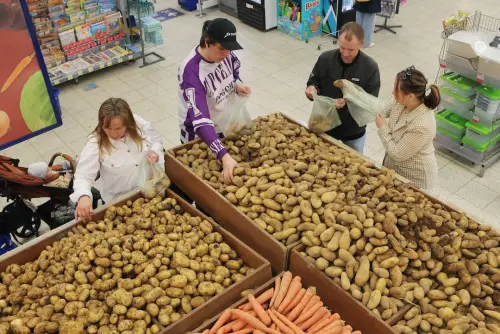Introduction
In Russia, the impact of rising food prices on the economy is becoming increasingly critical, particularly in light of the recent influx of guest workers. As central bank officials monitor these developments, inflationary pressures remain a key concern.Context
In Russia, food constitutes approximately 40% of the consumer basket used to measure inflation, contrasting sharply with 14% in developed economies like the United States. The surge in prices of staple foods, particularly potatoes, has prompted a tightening of the central bank's monetary policy, with the benchmark interest rate recently set at 20%—one of the highest levels since 2003. Despite a slowdown in actual inflation rates, public expectations of future inflation are high.Developments
Potato prices have soared, tripling in the past year due to a 12% decline in last year's crop yield. A 67-year-old pensioner remarked on the exorbitant costs outside a Pyaterochka discount store in Moscow, voicing concerns that many individuals may refrain from purchasing potatoes at current prices. Central bank governor Elvira Nabiullina acknowledged the grim reality, noting that citizens are prioritizing food purchases over non-essential items like electronics.
- As of April, Russian households dedicated 35% of their income to food, significantly up from 29% the previous year, according to the Romir think tank.
- Current prices at Pyaterochka for potatoes stand at 84 roubles for old crop and 120 roubles for new crop, a stark increase from 43 roubles per kilo during the same period last year.
Other staple ingredients, including onions and cabbage, have also experienced notable price hikes. This situation has even bemused President Vladimir Putin, who has previously lauded Russia's agricultural achievements amidst Western sanctions.
Government Response
To mitigate the crisis, the Russian government has ramped up imports, with Egypt increasing its potato supply threefold. Meanwhile, Belarus has reported an empty stockpile for potatoes. Farmers attribute crop failures to poor weather and rising operational costs, including machinery, fuel, and fertilizers.Future Outlook
Despite the challenges, there is cautious optimism regarding the upcoming harvest. Looking forward, Agriculture Minister Oksana Lut predicted a price stabilization beginning in July. However, the TsMAKP think tank's research indicates that inflation rates for low-income households have surpassed 20% in April, which is significantly higher than the official rate.With pensions averaging 23,448 roubles per month, many citizens, particularly pensioners who represent more than a quarter of the population, are feeling the effects of soaring prices. Sergei Aleksashenko, a former central bank official, highlighted the disproportionate impact of inflation on low-income individuals.
